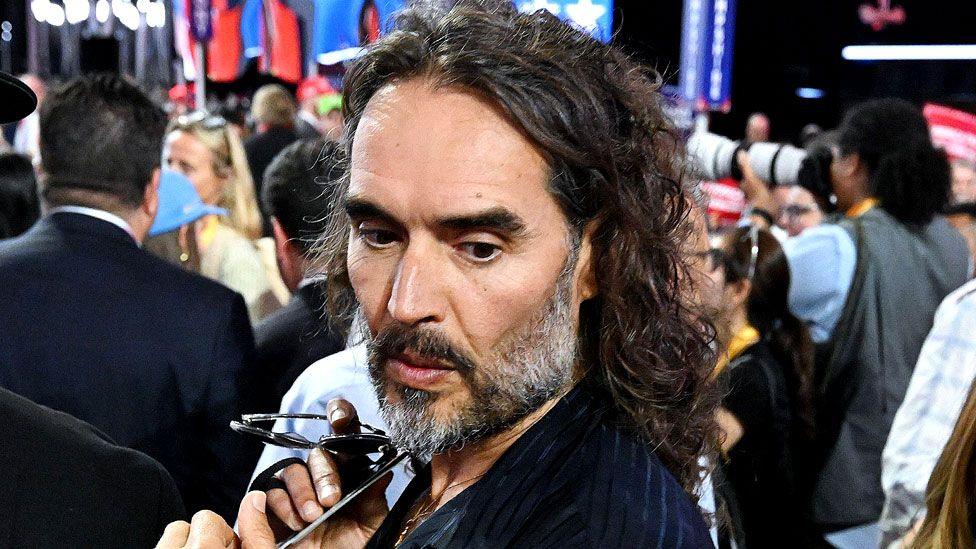Russell Brand Rape Case Sparks U.S. Extradition Fight.
Russell Brand, a name once synonymous with offbeat humour and chaotic charm, now finds himself at the center of a criminal case that spans decades, continents, and a growing sense of cultural reckoning. The Metropolitan Police confirmed this week that Brand has been charged with five sexual offences involving four different women. The charges include rape, oral rape, indecent assault, and two counts of sexual assault—all relating to alleged incidents that took place between 1999 and 2005 in London and Bournemouth.
Brand, now 50, has publicly denied all the accusations, claiming that every one of his past relationships has been consensual. But after a year-and-a-half-long investigation, British prosecutors say they’ve seen enough to proceed.
The allegations came to light in 2023, when The Sunday Times and Channel 4’s Dispatches published a joint exposé featuring first-hand accounts from several women. That report sparked public outrage and led to renewed scrutiny by law enforcement. Now, the investigation has turned into formal charges—and a looming court date at Westminster Magistrates’ Court, scheduled for May 2.
The question is: will Brand even show up?

Russell Brand charged with rape and sexual assault
A Legal Case with International Reach
Brand isn’t currently in the UK. He’s believed to be living in Florida with his wife and children. If he decides not to return on his own, British authorities may have to take things to the next level, and that means extradition.
This isn’t just a procedural move—it’s a serious legal undertaking that could stretch out for years. While the UK and U.S. have an extradition treaty that makes such transfers possible, the process is rarely quick or predictable, especially when it involves someone in the public eye.
To even get started, UK officials would need to issue a formal request through the U.S. Department of Justice. A federal judge would then have to determine whether the request is valid under U.S. law. Only after that would the matter land on the desk of the Secretary of State, who has the final say.
In short: if Brand doesn’t return willingly, this could get complicated—and fast.
How Solid Are the Charges?
In the UK, the Crown Prosecution Service doesn’t press charges lightly. For a case to move forward, prosecutors must be convinced there’s a “realistic prospect of conviction” and that it’s in the public interest to proceed.
This case ticks both boxes, according to the CPS. Investigators have reportedly gathered witness statements, digital records, and supporting evidence over many months. Officers trained in handling sexual assault cases have been working closely with the alleged victims, who remain anonymous under UK law. No further details have been shared publicly, in part to protect the integrity of the upcoming trial.
Some of the offences Brand is accused of fall under older laws, specifically the Sexual Offences Act of 1956. Others would be tried under the newer 2003 legislation. Either way, if convicted, Brand could be looking at a long prison sentence. In the UK, rape carries a maximum penalty of life behind bars.
What If He Doesn’t Come Back?
If Brand fails to appear in court, the UK could escalate the matter by seeking an international arrest warrant. That would trigger a formal extradition request to the United States—a move that could turn this case from a high-profile prosecution into an international legal and political debate.
The UK and U.S. signed an extradition treaty back in 2003. It’s meant to make the transfer of suspects smoother between the two countries. But in reality, cases like this tend to drag on. They can get tied up in appeals, political concerns, and public opinion. Just ask Julian Assange or Gary McKinnon—two people who spent years fighting extradition from the UK on very different charges.
In Brand’s case, the legal criteria for extradition seem fairly straightforward. The offences he’s accused of—rape, assault—are crimes in both countries. That’s called dual criminality, and it’s a basic requirement for extradition to move forward.
Still, there’s always room for challenges. Brand’s lawyers might argue that too much time has passed since the alleged events. In the U.S., some states have statutes of limitations that limit how long prosecutors have to bring charges. The UK has no such limit for sexual offences, but Brand’s legal team could claim the delay makes a fair trial harder to guarantee.
They could also raise human rights concerns, although that’s a harder sell when the extradition is between two Western democracies. Arguments about prison conditions or trial bias rarely succeed between the UK and U.S.—but they can buy time, and that’s sometimes all a defence team needs to shift the outcome.
Recent case law also suggests UK courts are becoming more cautious when handling U.S. extradition requests. In the case of Joseph El-Khouri, whose extradition was blocked by the UK Supreme Court, Edward Grange, extradition partner at Corker Binning, said the ruling would send “seismic shockwaves” through the U.S. Department of Justice. While that case involved white-collar crime, it reflects a growing judicial awareness of the need to carefully assess the fairness and proportionality of cross-border prosecutions.
Immigration Could Be Another Pressure Point
If the legal route hits delays, Brand may still face another problem: his visa. While there’s no public confirmation of his immigration status, it’s widely believed that he’s in the U.S. on an O-1 visa, which is reserved for people with “extraordinary ability” in fields like entertainment or media.
That kind of visa comes with a catch. It’s discretionary. It can be revoked if the holder is accused of serious criminal behaviour, especially crimes involving moral turpitude—a broad legal term that includes offences like rape, assault, and abuse.
In other words, if Brand becomes too much of a legal or reputational liability, the U.S. government could pull the plug on his stay. They wouldn’t need a court to do that. Immigration authorities could cancel his visa, place travel restrictions on him, or even detain him if they decide the situation warrants it.
This wouldn’t be Brand’s first brush with U.S. immigration. Back in 2010, he had a brief run-in at LAX after an altercation with paparazzi, which reportedly led to some extra attention from immigration officials. That incident was minor compared to what he’s facing now—but it shows the U.S. has kept an eye on him before.
Politics and Public Opinion Won’t Stay Quiet
The legal questions in this case are complicated enough on their own. But Brand isn’t just a defendant—he’s a celebrity with a huge following, particularly online. Over the last few years, he’s reinvented himself as a kind of anti-establishment commentator, challenging mainstream narratives and drawing millions of views in the process.
That kind of visibility changes things. If the U.S. drags its feet on extradition, critics will say it’s protecting a celebrity. If it moves too fast, some of Brand’s followers will claim he’s being targeted for his political views. It’s a lose-lose situation for the State Department, which will eventually have to weigh in if extradition becomes a reality.
And that’s the challenge here. This case is happening not just in courtrooms, but in the media, online, and in people’s living rooms. Everyone has an opinion—on Brand, on the justice system, on whether powerful men are ever really held to account.
The Bigger Message
Whether or not Russell Brand returns to the UK on his own terms, this case has already sent a message: no one is too famous—or too far away—to face legal scrutiny.
If he comes back, he’ll face the full weight of a British court. If he doesn’t, the UK may try to bring him back by force. And if the U.S. says no? That decision could carry its own consequences, both political and personal.
But beyond the headlines, beyond the courtroom drama, something deeper is at stake. This case isn’t just about one man and five charges. It’s about what justice looks like when celebrity, power, and international law collide—and whether the system is strong enough to rise to the moment.
You Might Also Like
-
Kansas Trooper Rescues 6-Year-Old Kidnapping Victim During Traffic Stop
-
Pastor Marvin Sapp Accused of Holding Congregation Hostage Over $40K Offering
-
Did North Dakota Mayor Tom Ross Commit Workplace Harassment — Even If It Was “Accidental”?
-
CEO Murder Suspect Luigi Mangione at Center of Sex Tape Scandal





















